Heading out for a vacation should be a time of relaxation, not stress. But if you’re a proud owner of a betta fish, the question of ” How to feed Betta fish while on vacation? “.
These vibrant little fish have specific dietary needs, and leaving them unattended for days could lead to serious health issues. In this article, we’ll dive into the best ways to ensure your betta fish are well-fed and happy while you enjoy your well-deserved break.
Betta Fish Dietary Needs
What Betta Fish Typically Eat
Betta fish are also called Siamese fighting fish, and we also say betta fish are meat eaters. In the wild, they thrive on a diet of insects and larvae. In betta fish vacation food, they need a protein-rich diet that mimics their natural food sources. High-quality betta pellets, freeze-dried bloodworms, and brine shrimp are common choices. These foods provide the necessary nutrients to keep your betta healthy and vibrant.
How Often Betta Fish Should Be Fed
A typical feeding schedule for a betta fish is small portions twice a day. Overfeeding leads to obesity and water pollution, while underfeeding results in malnutrition. It’s essential to find a balance that keeps your betta satisfied without compromising their health.
Risks of Leaving Betta Fish Unfed
How Much Betta Fish Can Survive Without Food
Betta fish are surprisingly resilient and can survive without food for up to 14 days. However, just because they can survive doesn’t mean they should be left unfed for extended periods. Going without food for too long can weaken their immune system, making them more susceptible to diseases.
Potential Health Issues from Irregular Feeding
Irregular feeding can lead to stress, which in turn can cause a host of health issues, including fin rot, bloating, and even more severe conditions like dropsy. Ensuring a regular feeding schedule, even while you’re away, is crucial to maintaining your betta’s health.
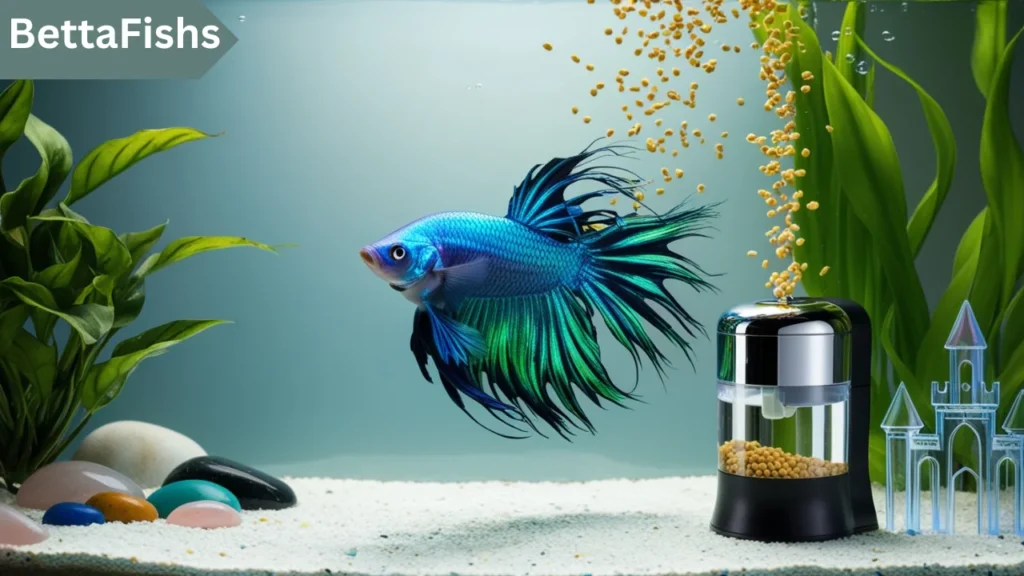
Preparing Your Betta Fish for Vacation
Adjusting Feeding Schedule Before Leaving
Before you head out, it’s a good idea to gradually adjust your betta’s feeding schedule to prepare them for your absence. Start by feeding slightly less than usual a few days before you leave. This will help reduce the shock if there’s a temporary drop in their food supply while you’re away.
Tips for Ensuring Your Betta Fish Is Healthy
Make sure your betta is in good health before you go. A sick or stressed fish will be more vulnerable during your absence. Conduct a water change, check the water parameters, and ensure the tank is clean. A healthy betta is more likely to endure a few days without food without any ill effects.
Feeding Options While on Vacation
Automatic Fish Feeders
Overview and How They Work
Automatic fish feeders are a popular choice for vacationing pet owners. These devices can be programmed to dispense food at specific times, ensuring your betta gets fed even when you’re not around. They are typically battery-operated and can be adjusted to release the right amount of food.
Pros and Cons
The biggest advantage of an automatic feeder is convenience. However, they can be unreliable if not set up correctly. There’s also the risk of overfeeding, which can lead to water quality issues. Make sure to test the feeder for a few days before your trip to ensure it’s working properly.
Vacation Feeding Blocks
What Are Feeding Blocks?
Feeding blocks are slow-dissolving blocks that release food into the water over a period of time. These are designed to provide a consistent supply of food while you’re away.
When to Use Feeding Blocks
Feeding blocks can be useful for short trips, but they come with their own set of risks. They can cloud the water and may not dissolve evenly, leading to potential overfeeding. They are best used as a backup rather than the primary feeding method.
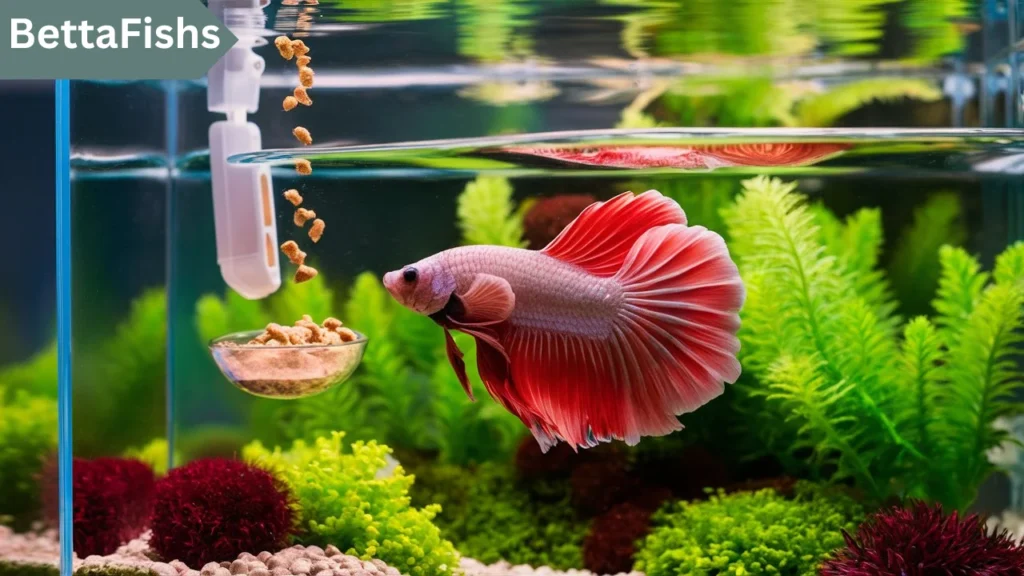
Asking a Friend or Neighbor for Help
What to Consider When Relying on Others
If you have a trustworthy friend or neighbor, you might consider asking them to feed your betta while you’re away. However, it’s important to make sure they understand the specific needs of betta fish.
Tips for Instructing a Caretaker
Leave clear, written instructions about the amount and type of food to give. If possible, pre-measure the food portions to avoid overfeeding. It’s also a good idea to have them check the water conditions and make sure everything is in order.
Hiring a Professional Pet Sitter
Benefits of Professional Help
Hiring a professional pet sitter who has experience with fish can give you peace of mind. They will not only feed your betta but also monitor their health and tank conditions.
How to Find a Reliable Pet Sitter
Look for sitters with good reviews and preferably those who specialize in aquarium care. Websites that list professional pet sitters can be a good starting point. Always interview the sitter and discuss your betta’s needs before making a decision.
Using Live Food or Plants
Types of Live Food Suitable for Betta Fish
Live food such as daphnia, brine shrimp, or microworms can be a good supplement while you’re away. These creatures can survive in the tank for a while, providing a more natural feeding option for your betta.
How Plants Can Supplement Feeding
Certain live plants, like java moss, can harbor small organisms that betta fish can eat. While not a complete feeding solution, plants can provide a small, natural source of food.
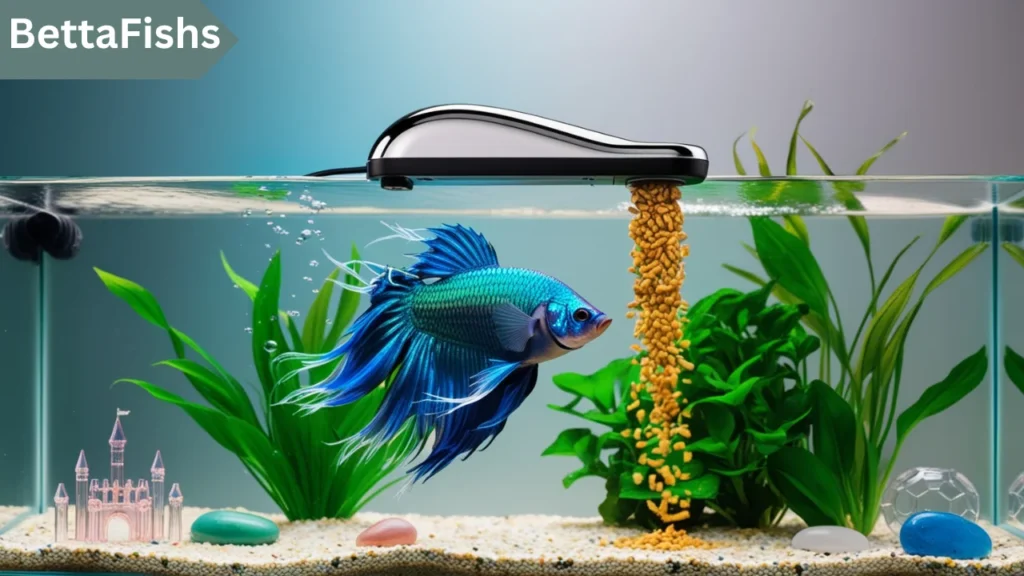
What to Avoid When Feeding Betta Fish During Vacation
Overfeeding Risks
Overfeeding is one of the most common mistakes when leaving food for a betta fish. Excess food can quickly foul the water, leading to toxic conditions that can harm your fish.
Common Mistakes with Automatic Feeders
Automatic feeders, while convenient, can malfunction or be incorrectly programmed. Double-check the settings and ensure the feeder dispenses the correct amount of food.
Why Not to Rely Solely on Feeding Blocks
Feeding blocks should be used with caution. They can dissolve too quickly or too slowly, leading to either overfeeding or starvation. It’s better to combine them with other feeding methods for more consistent results.
Monitoring Betta Fish After Returning
Checking for Signs of Stress or Illness
Once you’re back from vacation, observe your betta closely for any signs of stress or illness, such as lethargy, faded colors, or abnormal swimming patterns. Address any issues promptly to prevent long-term health problems.
Adjusting Back to Regular Feeding Schedule
Gradually reintroduce your regular feeding schedule. Your betta might be a bit hungrier than usual, but resist the urge to overfeed. Slowly increase the portion size to what it was before you left.
Conclusion
Ensuring your betta fish is well-fed and cared for while you’re on vacation doesn’t have to be stressful. With their dietary needs and choosing the right feeding strategy, you can enjoy your time away without worrying about your aquatic friend. Whether you opt for an automatic feeder, enlist the help of a friend, or use a combination of methods, planning ahead is key to keeping your bet fish healthy and happy in your absence. Remember, the well-being of your betta fish depends on consistency and proper care, so whatever method you choose, make sure it’s reliable and well-tested before you leave.
FAQs
How Many Days Can a Betta Fish Go Without Eating?
Betta fish can survive up to 14 days without food, but this should be avoided whenever possible. While they can live without food for this long, going without feeding for extended periods can lead to weakened immune systems and increased stress, which might result in long-term health issues.
Are Automatic Feeders Safe for Betta Fish?
Yes, automatic feeders can be safe and effective if set up correctly. However, it’s crucial to test the feeder for a few days before your trip to ensure it’s dispensing the correct amount of food. Also, check the batteries and make sure they are fully charged or new to avoid any malfunctions while you’re away.
Can Betta Fish Eat Human Food as a Substitute?
No, betta fish should not be fed human food. Betta fish have specific dietary needs that are best met with specialized fish food, like high-quality betta pellets or live/freeze-dried insects. Human food can be harmful and does not provide the necessary nutrients that betta fish require to stay healthy.
Should I Do a Water Change Before I Leave?
Yes, performing a water change before you leave for vacation is a great idea. A clean tank will reduce the risk of water quality issues while you’re away, especially if you’re using automatic feeders or feeding blocks, which can contribute to waste in the tank.
What Should I Do If My Betta Fish Looks Sick When I Return?
If your betta fish shows signs of illness after your return, such as lethargy, clamped fins, or discoloration, act quickly. Start with a water change and closely monitor their condition. If symptoms persist, consider treating the water with aquarium-safe medications and consult a vet or an aquarium specialist for advice.


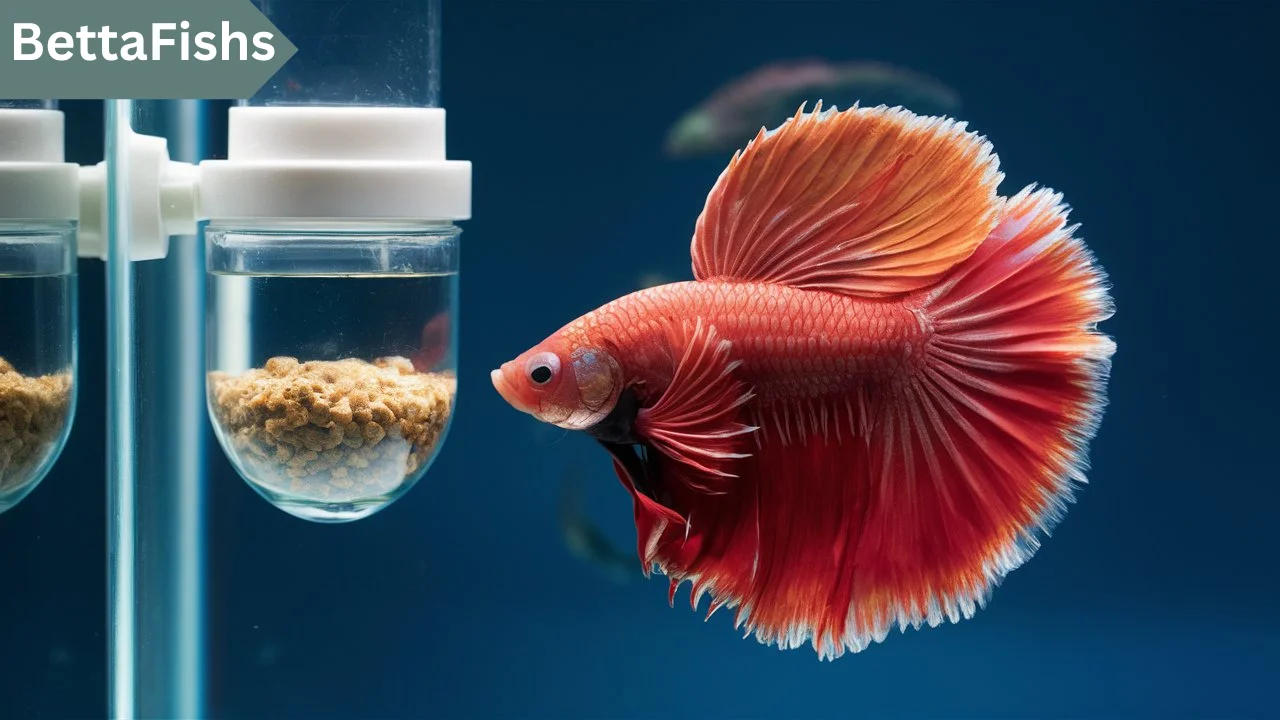

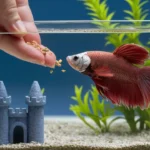
3 Comments
Leave a Reply3 Pings & Trackbacks
Pingback:How much to feed a Betta fish?
Pingback:How Often Should You Feed a Betta Fish Bloodworms?
Pingback:How Often Should You Feed Betta Fish?